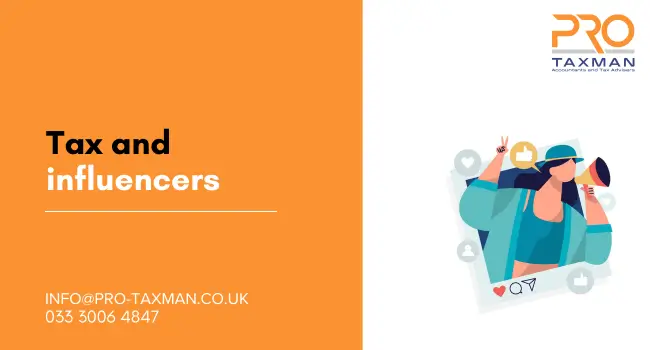Earlier this year, HMRC sent ‘nudge’ letters to social influencers who they suspect may not have declared the tax that they owe. They have also cracked down on gifts provided to influencers in return for promoting brands.
Social media influencers and content creators, including those running blogs, may receive payments in cash. This may be in the form of sponsorship. They may also receive gifts in return for promoting a band. Many are unaware that this counts as income on which they must pay tax.
Normal trading rules apply
The first point to note is that there are no special tax rules for online traders, influencers and content creators – normal tax rules apply. Consequently, where they have trading income in excess of the £1,000 trading allowancethey must declare it to HMRC. Anyone who is not already registered for Self Assessment must do so. This can be done online on the Gov.uk website.
Income tax will be payable on profits to the extent that they are not sheltered by the personal allowance. As with other traders, influencers and content creators can opt to deduct the £1,000 trading allowance to arrive at their taxable profit where this is beneficial rather than actual costs. This will be the case where costs are less than £1,000. Class 2 and Class 4 National Insurance are also payable once profits exceed £12,570.
Gifts
Many influencers receive gifts from brands. This may take various forms. The brand may simply send a gift to an influencer with a high number of followers as a goodwill gesture in the hope that they will promote it. This is in the nature of a business gift in that it is voluntary without any expectation of anything in return.
A brand may also gift a product to an influencer in return for the influencer promoting that brand or advertising that item. The influencer may be expected to provide a minimum number of posts including affiliated links to the brand’s site. HMRC do not consider gifts of this nature to be simple business gifts as something is expected in return. Rather, the ‘gift’ constitutes non-monetary consideration for the promotion of the brand’s business or for advertising a specific product. This is the case even if there is no formal contract between the brand and the influencer; HMRC consider there to be an implied contract representing a barter transaction. Influencers and content creators who receive gifts in this way must pay tax on those gifts. The gift isvalued at the amount for which the influencer could sell it rather than its retail value.
Need professional accounting service or accounting advice? Contact us to book a 15-min Free Consultation with us today.
To find out more please follow us on Facebook, Twitter, or LinkedIn. Feel free to contact us on 0333 006 4847 or request a call back by texting 075 6464 7474

